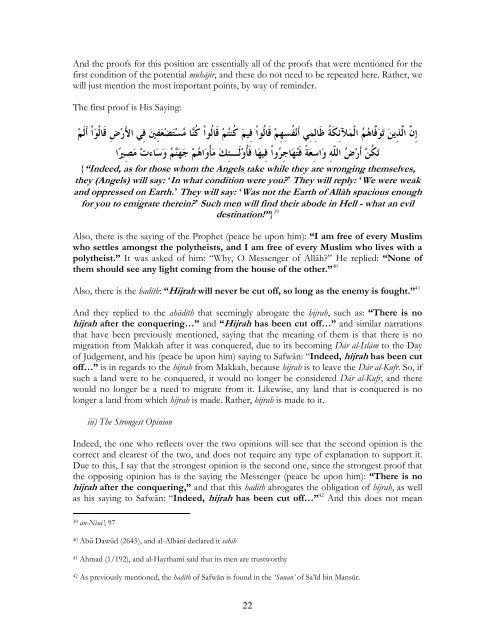And the proofs for this position are essentially all of the proofs that were mentioned for thefirst condition of the potential muhājir, and these do not need to be repeated here. Rather, wewill just mention the most important points, by way of reminder.The first proof is His Saying: {“Indeed, as for those whom the Angels take while they are wronging themselves,they (Angels) will say: ‘In what condition were you?’ They will reply: ‘We were weakand oppressed on Earth.’ They will say: ‘Was not the Earth of Allāh spacious enoughfor you to emigrate therein?’ Such men will find their abode in Hell - what an evildestination!”} 39Also, there is the saying of the Prophet (peace be upon him): “I am free of every Muslimwho settles amongst the polytheists, and I am free of every Muslim who lives with apolytheist.” It was asked of him: “Why, O Messenger of Allāh?” He replied: “None ofthem should see any light coming from the house of the other.” 40Also, there is the hadīth: “Hijrah will never be cut off, so long as the enemy is fought.” 41And they replied to the ahādīth that seemingly abrogate the <strong>hijrah</strong>, such as: “There is no<strong>hijrah</strong> after the conquering…” and “Hijrah has been cut off…” and similar narrationsthat have been previously mentioned, saying that the meaning of them is that there is nomigration from Makkah after it was conquered, due to its becoming Dār al-Islām to the Dayof Judgement, and his (peace be upon him) saying to Safwān: “Indeed, <strong>hijrah</strong> has been cutoff…” is in regards to the <strong>hijrah</strong> from Makkah, because <strong>hijrah</strong> is to leave the Dār al-Kufr. So, ifsuch a land were to be conquered, it would no longer be considered Dār al-Kufr, and therewould no longer be a need to migrate from it. Likewise, any land that is conquered is nolonger a land from which <strong>hijrah</strong> is made. Rather, <strong>hijrah</strong> is made to it.iii) The Strongest OpinionIndeed, the one who reflects over the two opinions will see that the second opinion is thecorrect and clearest of the two, and does not require any type of explanation to support it.Due to this, I say that the strongest opinion is the second one, since the strongest proof thatthe opposing opinion has is the saying the Messenger (peace be upon him): “There is no<strong>hijrah</strong> after the conquering,” and that this hadīth abrogates the obligation of <strong>hijrah</strong>, as wellas his saying to Safwān: “Indeed, <strong>hijrah</strong> has been cut off…” 42 And this does not mean39 an-Nisā’; 9740 Abū Dawūd (2645), and al-Albānī declared it sahīh41 Ahmad (1/192), and al-Haythamī said that its men are trustworthy42 As previously mentioned, the hadīth of Safwān is found in the ‘Sunan’ of Sa’īd bin Mansūr.22
that the ruling of <strong>hijrah</strong> has been abrogated, as it means, as Ibn al-‘Arabī said: “It means thatthere is no <strong>hijrah</strong> from Makkah after its conquering, due to Makkah having become Dār al-Islām to the Day of Resurrection. 43 So, he (peace be upon him) intended that there is no<strong>hijrah</strong> after the conquering of a land by the Muslims.And his (peace be upon him) saying to Safwān: “Indeed, <strong>hijrah</strong> has been cut off…” is inregards to the <strong>hijrah</strong> from Makkah, because <strong>hijrah</strong> is to leave the Dār al-Kufr. So, if such a landwere to be conquered, it would no longer be considered Dār al-Kufr, and there would nolonger be a need to migrate from it. Likewise, any land that is conquered is no longer a landfrom which <strong>hijrah</strong> is made. Rather, <strong>hijrah</strong> is made to it.”As for the saying of the Messenger (peace be upon him): “The Muslim is the one whoprotects the Muslims from his tongue and hand, and the muhājir is the one whoabandons that which Allāh has forbidden,” 44 we say that <strong>hijrah</strong> is to abandon sins anddisobedience, as they have said. However, this does not mean that there is no physical <strong>hijrah</strong>,as there is no contradiction between the two. In fact, from the results of physical <strong>hijrah</strong> isthat one abandons sins and disobedience, and from the results of abandoning physical <strong>hijrah</strong>is that one remains in the lands of disbelief, staying in an environment of sin anddisobedience, side-by-side with them, even if he does not perform such sins himself. So,what should be said is that there are two types of <strong>hijrah</strong>: spiritual <strong>hijrah</strong> and physical <strong>hijrah</strong>,with each type being a requirement. The second type encompasses the first type, and there isno doubt in this. There is a principle that says ‘We act according to both indications ratherthan ignore one of them,’ and this way, there can never be abrogation between the twoexcept if there is a proof that would prevent us from reconciling between the two proofs, asabrogation is essentially the complete reversal of a ruling regardless of the proofs for thatruling. This is where the problem is with this reasoning in looking at the hadīth, as a Shar’īruling is being denied without any proof.This opinion that I have leaned towards is the chosen opinion of all the leaders of the Salafīda’wah, and the one who looks through ‘ad-Durar as-Saniyyah,’ the recorded statements of thescholars of Najd, as well as the writings of Shaykh Muhammad bin ‘Abd al-Wahhāb willknow this with certainty, to the point that Shaykh ‘Abd ar-Rahmān bin Hasan said: “IbnHajar mentioned that just as <strong>hijrah</strong> is obligatory from the lands of disbelief, it is alsoobligatory from the lands of Islām in which a Muslim is unable to openly fulfill anobligation.” Shaykh ‘Abd ar-Rahmān bin Hasan added: “Likewise, it is obligatory uponeveryone in a land of sin in which he cannot work to change these sins to make <strong>hijrah</strong> towhere he can comfortably worship Allāh, due to the Saying of Allāh: 45 46{“So, do not remain with the wrongdoing people after the reminder…”}43 The question of Makkah being Dār al-Islām until the Day of Ressurection is addressed later in the book.44 al-Bukhārī (10)45 al-An’ām; 6846 ad-Durar as-Saniyyah’ (8/291)23


